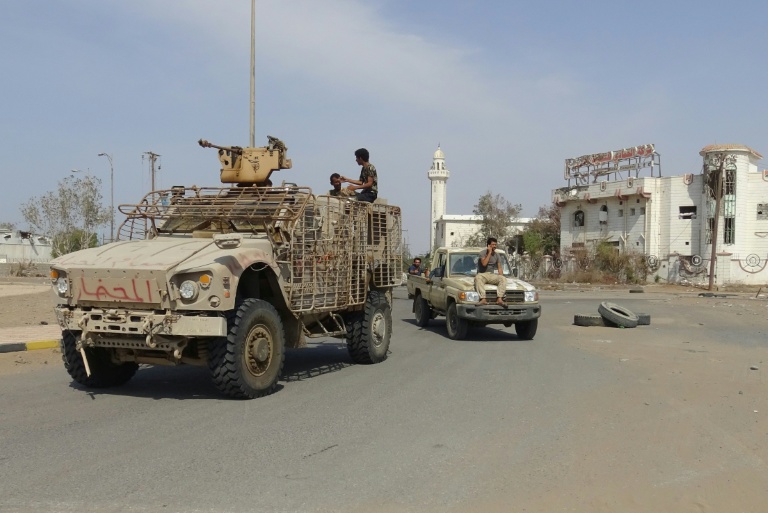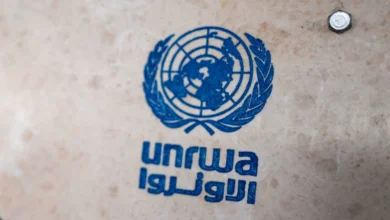
Yemeni rebels have begun to withdraw from the port of Hodeida, under a truce agreement, a UN official said Saturday, amid doubts over the handover process by pro-government forces.
The UN official, who requested anonymity, said the Huthi rebels began to pull back from the Red Sea port at midnight (2100 GMT Friday).
But a pro-government official told AFP that the loyalists were “surprised” by reports of a port handover.
“Who is that that they handed the port to and how,” the official said.
“The Huthis have taken advantage of their control of Hodeida and placed their fighters in both the navy and coastguard, something that has been a major source of concern for the legitimate government.
“The UN has to have a clear mechanism in place to ensure that there is a proper recruitment process for these crucial infrastructures.”
In a statement carried by Yemen’s Saba state news agency, another pro-government official said that it was “a clear attempt by the rebels to warp the contents of the agreement” reached at peace talks in Sweden earlier this month.
The port is the entry point for food aid to 14 million Yemenis on the brink of famine, according to UN figures, and the rebel withdrawal is a key part of a ceasefire that went into effect on December 18.
Pro-government forces are also supposed to pull back from parts of the city they recaptured in an offensive they launched on June 13 with the backing of a Saudi-led coalition.
The Huthis began “the first phase of redeployment from the Hodeida port”, a rebel official told the Huthi-run Saba news agency.
The UN Security Council last week unanimously approved a resolution authorizing the deployment of observers to oversee the hard-won truce for Hodeida.
Retired Dutch general Patrick Cammaert is heading a joint truce monitoring committee, which includes both government and rebel representatives, and chaired its first meeting this week.
The UN-led panel addressed “the first phase of the implementation of the agreement… based on ceasefire, confidence building measures to deliver humanitarian assistance and redeployment,” a UN statement said.
It added that the panel would convene again on January 1 to discuss “detailed plans for full redeployment”.
Despite the start of the Huthi withdrawal, the agreement hit a stumbling block later on Saturday with the coalition saying the rebels had not allowed an aid convoy to leave the port.
Coalition spokesman Turki Al-Maliki said that the insurgents “denied the exit of the UN humanitarian convoy… headed to (rebel-held) Sanaa that was carrying 32 tonnes of flour,” in a statement carried by state-run Saudi Press Agency.
The Huthis, in turn, said in a statement that the road was “not yet unblocked because the other side has not withdrawn” from Hodeida city.
Shaky truce
The truce has remained shaky, with the two sides accusing each other of violations.
A resident reached by telephone on Saturday told AFP pro-government and rebel forces had exchanged fire briefly overnight.
The resident added that coalition jets were heard overhead on Saturday morning.
The pro-government official told AFP on Saturday that the Huthis have violated the truce 246 times, in which 21 loyalists were killed and 174 wounded.
“The coalition has not launched a single airstrike in Hodeida province since the ceasefire went into effect.,” he said.
“Since the ceasefire, the Huthis have erected eight new checkpoints, 109 barrier and dug up 21 new trenches.
“The impunity with which the Huthis are violating the ceasefire in Hodeida is deeply worrisome.”
In addition to the withdrawal of fighters from Hodeida, the agreement included a planned prisoner swap involving some 15,000 detainees.
A “mutual understanding” was also reached to facilitate aid deliveries to Yemen’s third city Taiz — under the control of loyalists but besieged by rebels.
The two sides have agreed to meet in late January for more talks to define the framework for negotiations on a comprehensive peace settlement.
The war between the Shiite Huthi rebels and troops loyal to President Abedrabbo Mansour Hadi escalated in March 2015, when he fled into Saudi exile and the Saudi-led coalition intervened.
Since then, the war has killed some 10,000 people, according to the World Health Organization, although human rights groups say the real death toll could be five times as high.
More than 22 million people — three quarters of the population — now depend on humanitarian assistance to survive.
Civil servants and teachers have been left without salaries for months, owing to the country’s collapsed economy, but those in Hodeida are set to finally receive their wages after Hadi on Thursday instructed the government to pay them.




